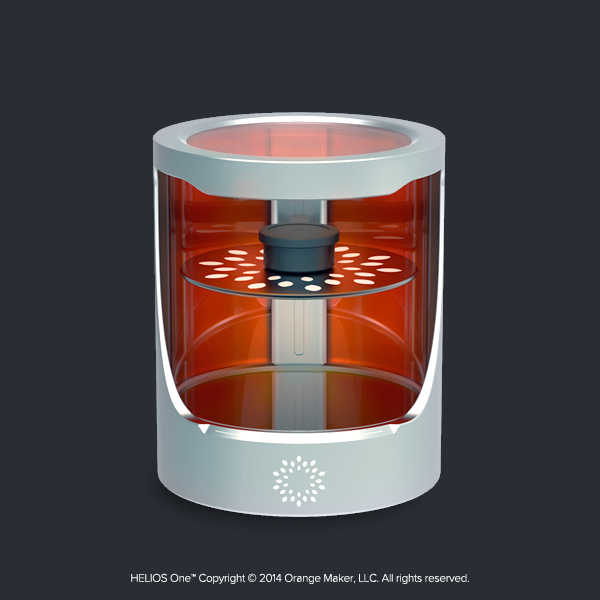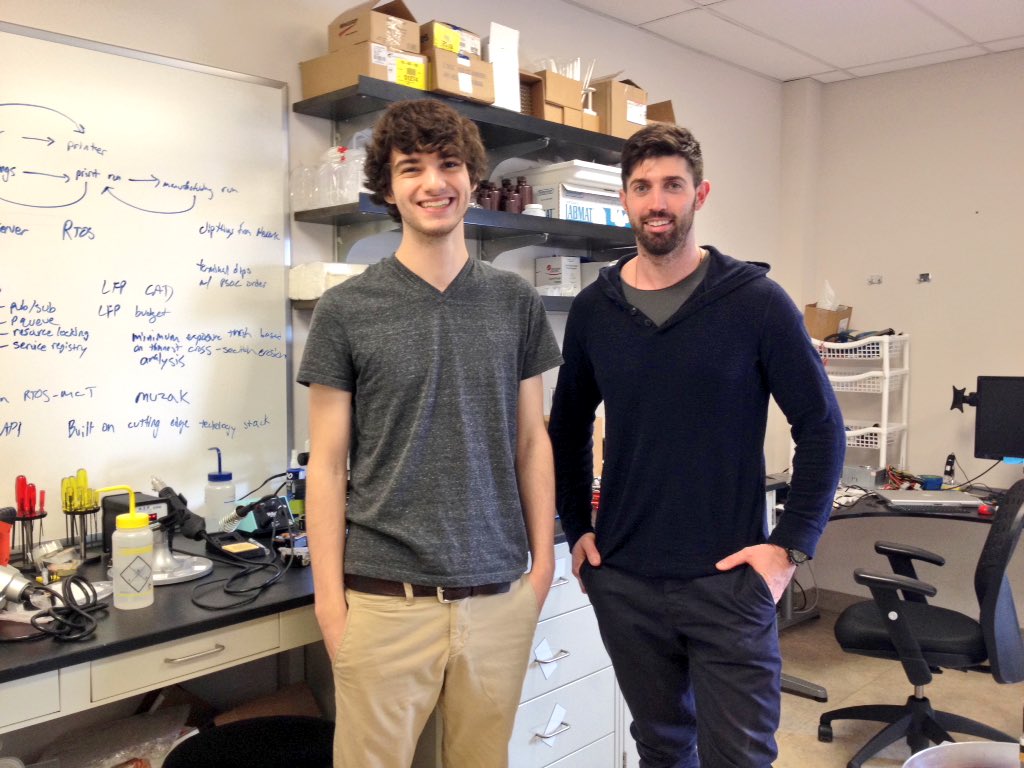The three founders of Orange Maker, a 3D-printing startup, left Los Angeles for Philadelphia this summer.
The trio — Kurt Dudley, Doug Farber and Chris Marion — moved into a University City apartment and got lab space at the University City Science Center’s 3624 Market St. building, an office that used to be occupied by BioBots, another Philly 3D-printing startup.
Orange Maker is developing a 3D printer, plus software and materials, that they say has real manufacturing capabilities: because of its spiral method of printing, it can produce objects at scale, unlike the other models out there.
The team is scattered around the country. About half of the 15 people working on the company are based in Philly now, while others are in New York, San Francisco and Los Angeles. But after three years of building out west, the founders decided to place their bets on Philly.
We were kind of surprised.
It’s not that Philly isn’t the right place for a startup like Orange Maker to move. It’s more that we haven’t seen many early-stage startups make this kind of move, unless a founder is following a spouse for a medical residency, for example, or a company is joining an accelerator.
So why’d they come? For one, Drexel sold them on the city.
Farber, 27, grew up in Abington, Pa., and went to Drexel, where he studied business (after graduating, he moved to LA and went into the music business but ditched it for the tech scene when he started to get the feeling that people cared more about profit than the creative, artistic side of the business). The school caught wind of Orange Maker when they came out of stealth mode last year and showed a lot of interest and support, including from president John Fry, Farber said.
“They clued us into the tech scene,” he said to us, the morning we visited him and Marion in their fifth floor office, down the hall from the labs of Graphene Frontiers and Cytovas. We didn’t sit around a table — instead, they arranged three rolling office chairs, not far from one of their large 3D printer prototypes, which sat on the floor. It felt ultra casual, like they hadn’t yet taken a meeting in the office.
As Farber and Marion’s joint Spotify playlist quietly played British electronic music darlings Disclosure, Farber marveled at all Drexel’s tech and innovation initiatives — none of which existed when he graduated in 2010 — like the ExCITe Center, the eye-catching URBN Center and Drexel’s evolving plans for an “Innovation Neighborhood.”

In Orange Maker’s office. (Photo by Juliana Reyes)
He described Drexel as the company’s “air-traffic controller,” pointing them in the direction of makerspace NextFab, the Science Center and Drexel professors who might be helpful, like Drakontas cofounder Bill Regli (who himself helped launch tech talent like Arcweb’s Chris Cera and CloudMine’s Ilya Braude). Regli’s name was scrawled on one of the whiteboards in the company’s office.
When reached for comment, Keith Orris, Drexel’s senior Vice President for Corporate Relations and Economic Development, said through a spokesman, “We’ve worked closely with Doug and Kurt over the past 18 months to support their efforts building Orange Maker and advancing their transformative technology. They grasped the benefits of being in close proximity to academic researchers and institutions, and the exciting community that Innovation Neighborhood is creating.”
Business success stories are good business for Drexel, especially as the university ramps up its entrepreneurial efforts.
Drexel’s business attraction efforts reminded us so much of the city’s that we suddenly wondered: “Did Drexel pay you to come here?”
“No,” Farber said with a laugh. “I wish.”
There are other reasons Orange Maker moved to Philly. Some of the people working on the Orange Maker team were already based in the region, like VP of Product Larry Ibbetson. Farber and Marion both grew up nearby. (With his mop of hair and ease with 3D-printing jargon, Marion, 22, comes off as something of a child genius. He spent a year at Rutgers, hated it, dropped out, developed a pyrotechnic technology that went viral on YouTube, met Orange Maker cofounder Dudley on a 3D-printing Yahoo group and ended up moving out to LA when he was 19 to join the company. His parents, he said, were cool with it. “They trusted me to a certain extent,” he said.)
Farber said the team is excited to be around all the “brilliant minds” that are working on projects in the one-mile radius of University City.
“We wanted to be a part of that,” he said.

The Orange Maker. (Courtesy photo)
Before you go...
Please consider supporting Technical.ly to keep our independent journalism strong. Unlike most business-focused media outlets, we don’t have a paywall. Instead, we count on your personal and organizational support.
Join our growing Slack community
Join 5,000 tech professionals and entrepreneurs in our community Slack today!

The person charged in the UnitedHealthcare CEO shooting had a ton of tech connections

From rejection to innovation: How I built a tool to beat AI hiring algorithms at their own game

How a laid-off AI enthusiast pivoted to become a founder — while holding down a day job


